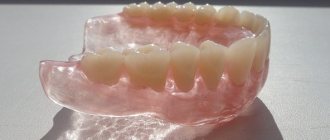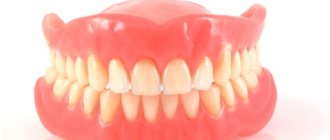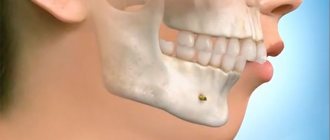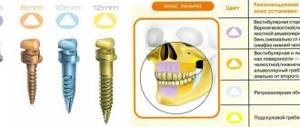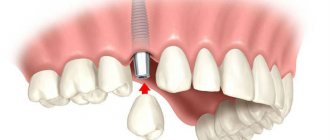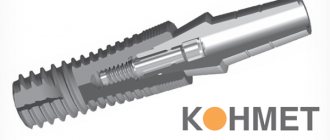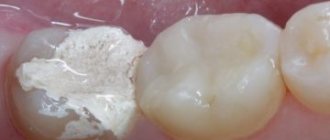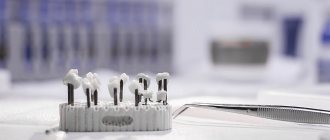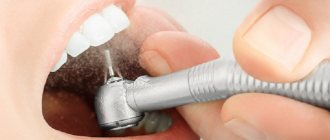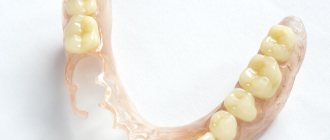- What is implantation
- Indications/contraindications
- Types of implants
- Factors affecting service life
- Why is there a risk of rejection?
- When to change
- Recommendations on how to extend the life of an implant
Among all types of dental reconstruction, implantation is considered the most complete and effective method, allowing you to restore one or more teeth and even the entire dentition. Because the procedure is expensive, the question often arises about how long dental implants last. The shelf life of artificial roots depends on several factors, which should be taken into account before implantation.
What is implantation
In the majority, people generalize methods for restoring teeth under the concept of “prosthetics.” This is not entirely correct. Implantation is a stage of reconstruction, which is the installation of an artificial root (implant), onto which a crown or solid prosthesis is subsequently attached.
Implantation is performed with an estimated period of 5 to 30 years. The service life of the product has the main influence on when the next dental implantation will be required, but there are a number of other factors that can shorten not the warranty period, but the actual service life.
In order to extend the period of wearing artificial roots, it is necessary to pay special attention to preparing for the procedure, to choose the right clinic/doctor and the products themselves, before carrying out the mini-operation to install the pins.
You should choose a dental clinic based on the following criteria:
- Long-term presence in the medical services market, good reputation, high professional level of doctors.
- A wide range of services in the field of implantation – doctors’ knowledge of various treatment methods.
- Availability of a license to perform dental implantation.
- Equipping the clinic with modern diagnostic and treatment equipment, its own dental laboratory.
Choose a doctor who has experience in implantation. In addition to the basic diploma of higher medical education, the doctor must have certificates confirming his qualifications and ability to work with products of specific brands. As a rule, the world's leading manufacturers of dental implants allow only doctors who have been trained by company specialists to work with their products.
Try to collect as much information as possible about the clinic’s activities and specialists. Look through reviews on official websites, thematic forums on the Internet, and entries in the “Book of Complaints and Suggestions.”
Consult with several doctors from different clinics and compare the opinions of specialists regarding your problem.
Be sure to draw up an agreement with the clinic for the provision of medical services, which must indicate all the features of the guarantee obligations provided in the event of unsuccessful treatment.
After implantation, strictly follow all doctor’s instructions and do not neglect preventive examinations.
Dental implantation is a complex multi-stage procedure that involves many doctors and specialists; during its implementation, expensive materials and equipment are used, so it cannot be cheap. Very often, the cheap price offered by some clinics is just a publicity stunt that does not guarantee a solution to your problems.
In reputable clinics, when installing an implant, the medical history indicates the number of the registration certificate, which is available for each quality product.
Indications/contraindications
Implantation is carried out exclusively according to indications. The need to install artificial roots is determined by the dentist who examines the patient at the first appointment.
The need for implantation is confirmed in the following indications:
- missing one tooth;
- absence of 2 or more dental organs, with adjacent location;
- absence of the last teeth without the possibility of restoration by other methods;
- complete edentia (congenital pathology characterized by the absence of teeth);
- the presence of reasons preventing the wearing of a removable denture (for example, a gag reflex);
- pain caused by functional occlusion;
- absence of alveolar processes in the upper jaw with concomitant complete absence of teeth;
- anatomical defects that arise as a result of diseases, mechanical effects, as well as as a result of disturbances during intrauterine development or genetic predisposition.
In professional dentistry, the patient is additionally sent for diagnostics to determine contraindications:
- severe diseases of the cardiovascular system;
- malignant oncological diseases;
- diseases of the nervous system;
- blood pathologies (especially poor clotting);
- severe connective tissue diseases;
- open tuberculosis;
- liver/renal failure during exacerbation;
- increased tone of the masticatory muscles in combination with bruxism;
- diabetes mellitus;
- immunodeficiency diseases;
- allergic reaction to painkillers;
- age up to 18 - 22 years (depending on indications);
- addiction to drugs or alcohol.
If a patient undergoes implantation with contraindications, the shelf life of dental implants will be reduced to 1 - 2 months, or even several days. In case of contraindications, 90% of patients experience rejection of the structure with the development of associated complications.
Types of implants
In dentistry, implants made of titanium material are used, since it is considered the most reliable and safe. All products are divided into several types according to design and shape. Depending on the indications, the most suitable installation option is selected. In addition to indications, the choice of implant model is also influenced by their cost. Modern designs tend to be more expensive, but more convenient and durable.
Based on the type of design, products are divided into two types: collapsible and non-collapsible. This characteristic affects the service life only due to the need to replace the crowns. Thus, fixed structures may require a complete replacement of the prosthesis after 5–16 years, while removable ones can last up to 12 years.
The duration of operation is affected by the shape of the artificial roots, since the reliability of the installation of the prosthesis depends on the type of implant.
- Lamellar - screwed into the bone tissue located under the palate;
- Root-shaped - installed in root canals;
- Combined - combine both previous types and are placed in the root canal.
Pins screwed into the root canal are considered the most durable, since with this type of installation it is possible to achieve excellent fixation.
Based on the material of manufacture, they are distinguished between ceramic-metal products with a guarantee of about 12 years, ceramic products - about 7 years, and metal-plastic products - no more than 3 years. There are also implants made of aluminum and zirconium, their service life is more than 15 years.
Factors affecting service life
Having decided to undergo implantation, you must first familiarize yourself with all the requirements for the reliability of products. The average service life of dental implants is 15 years, but when counting on installing a reliable design, you need to understand that the cost will not be cheap.
Criteria for the characteristics of implants:
- strength - resistance to constant loads;
- product quality;
- type of production technology;
- material of manufacture;
- installation method.
A major role, as already mentioned, is played by the patient’s health status. Before implantation, oral approval should be performed. The presence of even minor inflammation or caries suggests a risk of implant rejection.
An important point is the professionalism of the doctor. if the structure itself is not installed securely, then most likely the pin will move or fall out.
Manufacturer and Dental Warranties
When implanting, it is better to know well-known manufacturers that have positive reviews. As a rule, you can always find information about certain implants and how long the products of a given manufacturer last. However, it is worth considering that dentistry and the manufacturer give different guarantees, since the manufacturer is based on the characteristics of the product, and the dental company takes into account the operating conditions.
Implants come in budget, medium and premium classes. Manufacturers such as AstraTech, XIVE Friadent and Nobel provide a lifetime guarantee; their products are premium and have increased strength and healing rates.
Average-priced implants have a service life (from the manufacturer) of an average of 20 years. The manufacturer's warranty for artificial roots is no more than 10 years.
Dentists, as a rule, establish a guarantee of no more than 3 years, since patients often do not follow the doctor’s recommendations for care throughout the entire period of use. The guarantee provided is confidence in the work done by the doctor.
Implant replacement
A person who is thinking about installing a modern prosthesis sooner or later faces the question of how long a dental implant lasts and what happens next. Despite the long warranty from the manufacturer, implantologists themselves provide a guarantee for a shorter service life of the structure, which is usually 1-2 years. Any dental clinic has the right to set warranty periods for its services independently; this is not regulated by law.
Such a small guarantee from the doctor is due to the fact that it only covers the quality of the implantologist’s work. If errors were made during the operation, the implant will be rejected within one to two years (the probability of this is less than 5%). When such a nuisance occurs after a long period of time, the cause is most likely due to improper oral care or deterioration in the patient’s health. It is not always possible to establish the true reason for the rejection of a structure.
Conscientious implantologists in this case undertake the reinstallation of the prosthesis. But it often happens that the patient is forced to go to another clinic to have the implants reinstalled. This happens because he was denied installation of a new implant under warranty or he lost confidence in the doctor who performed the initial operation. Symptoms that the implant needs to be replaced are its mobility and inflammation of the tissue around the structure. In this situation, there will be pain, bleeding, and pus may be released.
This condition is called peri-implantitis. Subsequently, the implant is rejected. If the doctor determines that the structure has reached the end of its service life, surgery is prescribed to remove the rod from the jaw. The implant can be re-inserted after 1-2 months. If contraindications to its installation are identified, the patient is offered alternative methods of prosthetics.
Why is there a risk of rejection?
No manufacturer or dentist can claim that an implant will not be rejected 100%, since sometimes a complication occurs simply due to the body’s individual reaction to a foreign body.
The guarantee provided by dentistry is to protect the patient from complications in the event of rejection:
- due to a doctor’s error during installation (failure to comply with sanitary standards, incorrect installation, etc.);
- due to inconsistency of product quality.
If the patient did not follow the recommendations, or the implant was rejected after 2 - 4 years or more, then we are not talking about a medical error or poor quality. Most likely, pathological processes are occurring in the patient’s body, which become the cause. In such cases, the clinic, of course, does not bear responsibility.
Note! According to statistics, implants are rejected in only 2% of patients.
We install durable, safe metal-free crowns
Dr. Levin's Dental Center has its own dental laboratory, which produces individual dentures for the clinic's patients. We install durable, safe metal-free structures. Quality is achieved through materials and digital production technologies.
Levin Dmitry Valerievich
Chief physician, Ph.D.
When to change
After implantation, you should visit your dentist every 6 months. As soon as a specialist detects signs of product rejection or sees that the design no longer meets quality requirements, a decision is made to remove and possibly replace the structure.
Changing the implant is necessary if:
- pin mobility;
- severe pain at the attachment site;
- bleeding;
- severe swelling;
- signs of suppuration;
- swelling of the face in the area of implant installation.
If the patient himself notices such signs, then he should contact a specialist immediately. Similar symptoms can occur both in the first days and years later.
